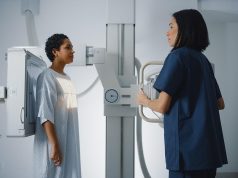Deep learning model dismissed 39.7 percent of MRI examinations without lesions from women with extremely dense breasts
TUESDAY, Oct. 19, 2021 (HealthDay News) — A deep learning (DL) model can dismiss almost 40 percent of magnetic resonance imaging (MRI) breast examinations without lesions while not missing any malignancies in women with dense breasts, according to a study published online Oct. 5 in Radiology.
Erik Verburg, from the University Medical Center Utrecht in the Netherlands, and colleagues examined the feasibility of an automatic triaging method using DL to dismiss the highest number of MRI examinations without lesions while not affecting identification of malignant disease. A model was developed to differentiate between breasts with and without lesions, and was trained using data from seven hospitals and tested on data from an eighth hospital. This secondary analysis used data from 4,581 MRI examinations from 4,581 women with extremely dense breasts (mean age, 54.3 years) who were included in the DENSE trial.
The researchers found that 838 of the 9,162 breasts had at least one lesion, of which 77 were malignant, and 8,324 had no lesions. At a threshold set for 100 percent sensitivity for malignant lesions, the DL model considered 90.7 percent of the MRI examinations with lesions to be non-normal and triaged them to radiologic review. Overall, 39.7 percent of the MRI examinations without lesions were dismissed by the DL model. For differentiation between normal breast MRI examinations and MRI examinations with lesions, the DL model had an average area under the receiver operating characteristic curve of 0.83.
“We showed that it is possible to safely use artificial intelligence to dismiss breast screening MRIs without missing any malignant disease,” Verburg said in a statement. “The results were better than expected. Forty percent is a good start. However, we have still 60 percent to improve.”
One author disclosed financial ties to Bayer Pharma.
Copyright © 2021 HealthDay. All rights reserved.








